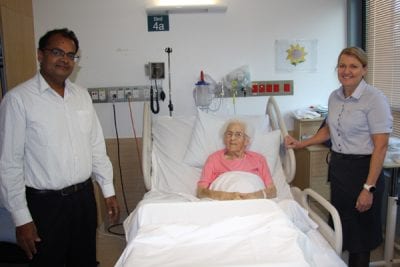
Members of TPCH’s Fractured Neck of Femur service, Dr Chrys Pulle (geriatrician) and Madonna Dalton (CNC Ward 2C), with patient Gerri Schoolderman.
The establishment of TPCH’s Fractured Neck of Femur (NOF) service 10 years ago marked the start of a new era of care for elderly individuals with a broken hip.
The 22-bed ward, which was the first its type in Queensland, is a dedicated unit that provides all aspects of care to patients from admission right through to discharge.
The NOF ward was established in recognition of the complex care requirements of elderly patients who have experienced the trauma of a hip fracture. Geriatrician Dr Chrys Pulle, who establish the unit, said that patients who suffer a hip fracture are typically older, frail patients who are risk of rapid deterioration once hospitalised.
“The goal of the Fractured NOF service is to get these patients to surgery quicker to improve their health outcomes, while providing them with the necessary care before and after,” Chrys said.
Care is delivered by a multi-disciplinary team of health professionals including orthopaedic surgeons, geriatricians, nurses, physiotherapists, occupational therapists, speech therapists, and dieticians.
Prior to this approach, patients who suffered a hip fracture would present to an emergency department where they could wait for longer than desirable, and would then be transferred between services to receive different phases of their care.
“Having a shared model of care in one central location, is essential in supporting these patients who are extremely vulnerable,” Chrys said.
“Hip fracture patients generally require very difficult nursing care, and are at high risk of other issues associated with caring for elderly people such as delirium and malnutrition. Older patients can experience a lot more pain and take much longer to rehabilitate following surgery.”
Since the Fractured NOF ward received its first patient in April 2010, it has cared for around 3000 patients with the average age of patients being 82. Today, the ward also accommodates non-operative fractures that require admission. The commencement of the Fractured NOF service has given rise to other important hospital service improvements.
“We have established a clinical pathway for hip fracture patients through the emergency department whereby waiting times are reduced, and patients can be transferred to the ward more quickly for vital pre-operative care,” Chrys said.
“Clinical nursing staff conducted research into fasting times which has changed clinical practice, resulting in a 50 per cent reduction in fasting times and better nutritional outcomes post-operatively.”